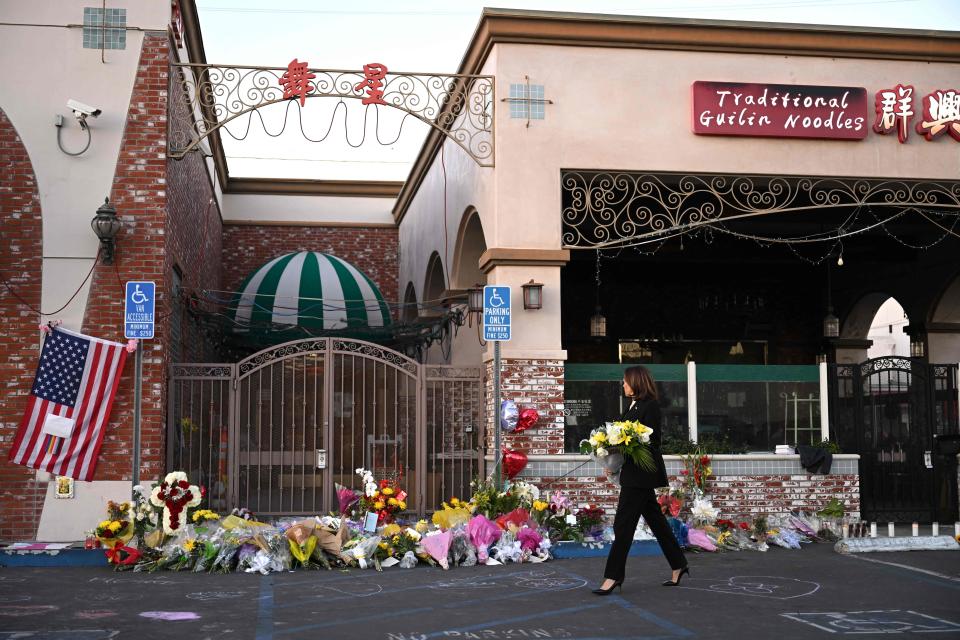How, as Asian Americans, do we make sense of senseless shootings in our community?
As of Jan. 23, our nation’s mass shooting toll for the year stands at 40.
Two of these deadliest shootings, in Monterey Park, Calif., on Jan. 21, and two days later, in Half Moon Bay, Calif., involved a majority of victims of Asian descent.
My initial reaction to hearing the news was sadness and outrage. Sadness that after three years of witnessing escalating anti-Asian violence, our community was targeted again. A Pew Research study finds that 63% of Asian Americans believe crime against our community is on the rise – to the point that 36% of us have altered our daily routine for fear of attack.
This, in contrast with data that report more than one-third of Americans are unaware of the rise of attacks against us, or believe this violence has decreased.
Anger at shootings turned to shame

I was outraged that a murderer would be so brazen to kill on the eve of our most venerated holiday; one that is also rife with superstitious traditions.
The prior day, my text chain with my best friend, who is also Chinese American, was us reminding each other of all the Lunar New Year taboos. While we don’t consider ourselves particularly “traditional,” it was ingrained since our childhood that our actions, down to when to wash our hair, would affect our luck in the coming year.
That’s why the Monterey Park Lunar New Year eve shooting doubly stung as an inauspicious omen. Who would desecrate tradition and purposely set an evil tone for our year to come?
As news unfolded that both mass shootings were Asian-on-Asian crime, my feelings turned to shame.
How could we do this to ourselves? What terrible optics. How can I protest “othering” when “the others” are within our own community?
We can't remain silent about violence
With shame, came silence. Perhaps if I didn't speak of these self-inflicted tragedies, they would melt into yesterday’s news.
Further conflicted, the Lunar New Year shuns any talk of death or killing. Again, a bad omen for the year to come.
What are the “rules” surrounding speaking of these mass shootings?
Another view:Gun violence is a pandemic. Let's act like it
It took me another couple days, and receiving emails from Asian American and Pacific Islander civic group leaders, to realize there are no rules. More importantly, this is not about saving face; it’s about saving our community.
Regardless of the motive or the race of the perpetrators, our community endures yet another act of violence. Violence that yet again sheds light on structural inadequacies in our system, and amplifies our calls for solidarity from our fellow Americans.
The pandemic set Asian Americans on edge
First and foremost, lawmakers across all levels of government need to prioritize coordinated state and federal gun control measures.
Semiautomatic weapons like those used by the perpetrators in both the Monterey Park and Half Moon Bay massacres have become the weapons of choice for killers to enact the most carnage possible. These are battlefield weapons that have no place in our civil society.
The fact that these incidents were Asian-on-Asian crime amplifies an SOS that our community has been signaling since the onset of the COVID-19 pandemic. We are a community already on edge.
AAPI Data documents that 1 in 6 Asian American adults experienced a hate crime or hate incident in 2021.
There also is empirical data to back up and quantify the cost of anti-Asian racism stemming from the COVID-19 pandemic. One study estimates that Asian restaurants lost more business than others, and billions of dollars in lost revenue, as anti-Chinese sentiment rose during the pandemic.
We need outreach, education to stop hate
Asian American, Native Hawaiian and Pacific Islander – AA&NHPI – in addition to being a mouthful, lumps together 26 ethnic groups, speaking 59 different languages other than English.
Where do we even start to adequately understand and address each community’s unique needs, especially when we are the most economically divided racial group in America?
How do we account for cultural, religious and linguistic differences when we paint with such broad strokes? These mass shootings further solidify our need for more community-based, in-language outreach for issues varying from mental health to domestic and caste-based violence, to immigrant support.
In 2021, I noted that out of the more than 200 governor’s boards and commissions that exist in Arizona, none are dedicated to AAPI civil rights.
In 2022, I advocated for the passage of House Bill 2638, legislation that would create Arizona-specific Asian American and Pacific Islander curriculum. The bill died before legislators had a chance to debate the issue.
More than 70% of Americans believe that anti-Asian racism should be addressed. Education is cited as the solution for combatting this hate.
So this February, in the shadows of immense national tragedy, we again attempt to make our mark on Arizona. Rep. Jennifer Pawlik and Sen. Priya Sundareshan are championing legislation that will include the teaching of AAPI curriculum when state standards are renewed.
These are small steps we can take to start normalizing, and even celebrating, the faces and stories that look like ours.
Yvonne So is a mom, AAPI activist and host of the upcoming iHeart Radio and Seneca Women podcast, “Cashing our Trillions,” a series that spotlights the work moms do to sustain the $1.5 trillion economy of unpaid female work. Reach her at cashingourtrillions@gmail.com.
This article originally appeared on Arizona Republic: How do Asian Americans like me make sense of California shootings?

